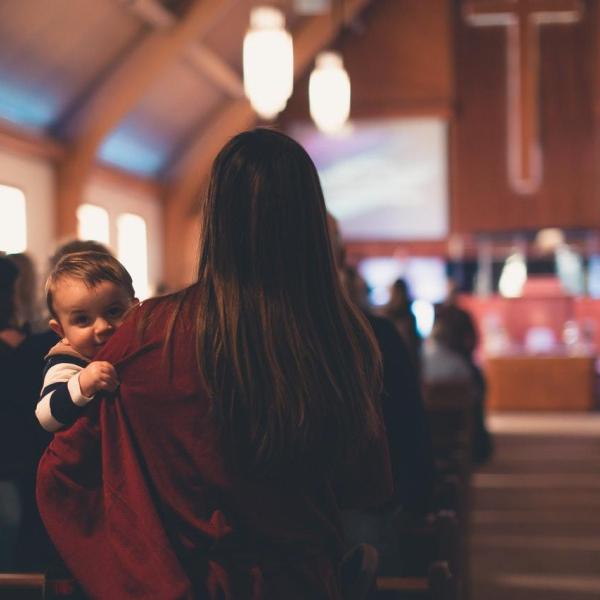What the Church needs to know about the real impact of support
How the Church can support foster and adoptive families and the difference it makes.
It’s no secret that Home for Good believes that the local church is ideally placed to wrap around families who foster or adopt in support. We talk about it a lot. (Here and here for example.)
So we really love it when we hear stories of families being supported by their church community, and, wonderfully, we hear these stories often.
It struck us, though, that while we hear these stories and we share them when we can, we might not always communicate the extent of what this support can really mean in the lived reality of foster carers, adoptive parents, and their precious children.
An understanding and supportive church can make a HUGE difference
Sometimes, it can be what enables a family to step into fostering or adoption in the first place:
“There are many ways that our church has shown that they are with us and for us as we have started fostering. We received so much encouragement and prayer as we started the process, and one church member looked after our birth children every week so we could attend the eight weeks of preparation workshops. We asked a few individuals and families to join our ‘official’ support network, and they have all been DBS checked so they can offer practical help with placements – as well as emotional support for us. We were delighted that others heard about this group and asked to join! We’ve had meals provided and the loan of clothes and toys as children have come into our home. We have been so touched by the way so many in our church have been sensitive to our change in lifestyle, and we feel very strengthened by the shared heart and vision of others. It really does make a big difference to know people are standing with us who understand what we are doing and why!” - Stu and Livy, foster carers
Having somewhere to turn when things are exceptionally challenging
And more than that, having people respond when things are exceptionally challenging, can make impossible things possible:
“Our little boy came home when he was 21 months old. Although we’ll never know the full extent of all he had experienced in his early life, one thing we knew for sure was that food caused him extreme anxiety. It’s likely he hadn’t always been given food regularly, so when mealtimes approached or he saw food being prepared, he got deeply distressed. Our elder adopted daughter had just turned five and was really struggling with such a huge change in her life already, so it was understandable that these times of high anxiety made her even more upset too. Those early days were already so hard, but mealtimes became impossible. I called our church leader in desperation, asking for help, and they responded in the most amazing way. Not only did they provide meals for us for ten days straight, they ensured that food arrived at our door hot and ready to eat at mealtimes. Removing the element of food preparation completely broke the cycle of stress for our little boy and his anxiety levels dropped right down. We were able to establish consistent routines and begin to gain his trust, while keeping things calm to help our daughter through such a huge transition. What our church did was simple and practical, but there are no words to explain the significance of it and the difference it made for our family.” - Marie, adoptive parent
Recognising, respecting and embracing the unique needs of every child
Even when families have cared for many children over many years, a church that seeks to understand and adapt to the current circumstances can make a placement possible:
“We have cared for more than twenty children over the past decade and our church has welcomed each one, and often helps us practically in different ways. Recently, a little boy was placed with us who had experienced extensive trauma and struggled with extremely challenging behaviour – it was our toughest placement to date. We questioned whether we could even take him to church but every week we were reassured that we were welcome there, and more importantly, that he was welcome there. Wherever possible, our leaders tried to engage him, and if it came to a situation when my wife or I had to step in, then nobody made a big deal of it. The best thing was that nobody stared. It made it possible for us to be able to help him calm down and then he could re-engage with the activity without it being an issue.” - Tim, foster carer
Prioritising the needs of foster and adoptive families so they are safe
A church that is willing to adapt and learn, and goes the extra mile to ensure that structures and processes work for foster and adoptive families, can remove anxiety and reassure:
“Sadly, we had to leave our last church. It broke our heart to do it but we had to put our adopted son first, and they just didn’t understand our concerns when they started using Facebook to broadcast services live. We explained the risks of him being on social media but their solution was that we should just keep him to the side – meaning he would never be able to engage in services with the other children. Our church now is completely different. They do all they can to make us feel welcome and valued and reviewed all their policies with us so we knew he would be safe. They seem genuinely pleased that we are there, and want to put our needs first. It has certainly restored my faith in church!” - Helen, adoptive parent
Being upfront about how much you value and care for vulnerable children
Obviously there are many ways you could do this, but one way is to become a Home for Good church, and then all foster and adoptive families will know just how important they are to you:
“We were on holiday this summer with our little foster child. We really wanted to get to church on the Sunday but hadn’t had time to research one beforehand, and didn’t have a good enough signal to look on our phones. So we just went into the nearest church hoping for the best, not a little nervous about how she would cope in a new setting and what kind of response we might get. Would she be too loud? Would she be unsettled? Would she even stay?When we arrived the vicar came over and introduced himself. I felt able to share our concerns with him, only to be told, ‘Oh don't worry about anything – we are a Home for Good church and we have several adoptive and foster families here. We understand your concerns.’ He went on to show us around so she knew where things were, and he left us with the words, ‘You are very welcome here.’It was amazing to find such a safe and welcoming place where we could worship together.” - Frances, foster carer
All in all, there really is a lot that the Church can do to support foster and adoptive families. To you, it might not seem that much, but for some families it can be affirming, reassuring, and even life-changing.
And for some children, it might be the first time they feel special.
Thank you for all you do for vulnerable children and young people and the families who care for them. Please keep doing it – and do more of it wherever you can.
You might also be interested in

Articles
Reflecting on Good Friday
Despite the outward appearance of a crushing setback, Good Friday was a day of triumph, unveiling God's divine plan and the true nature of his reign.
Read more
Articles
The Church: a community of shared light
Our Northern Ireland and Nations’ Lead, Roger Cooke shares some reflections on fire, community and the Olympic Games.
Read moreI would like to find out what is
going on in my area







